Prime Minister Liz Truss has resigned just over six weeks after taking the reins in No 10. Liz Truss has told the King she is resigning as leader of the Conservative Party.
In a statement outside No 10 she said: “I recognise… given the situation I cannot deliver the mandate on which I was elected by the Conservative Party.” Truss said there would be a leadership election to replace her “to be delivered within the next week”.
Liz Truss has said she will stay on as Prime Minister until a successor is chosen via a leadership election to be held within the next week.
Speaking in Downing Street, she said: “This morning I met the chairman of the 1922 Committee, Sir Graham Brady.
“We’ve agreed that there will be a leadership election to be completed within the next week.
“This will ensure that we remain on a path to deliver our fiscal plan and maintain our country’s economic stability and national security.
“I will remain as Prime Minister until a successor has been chosen.
“Thank you.”
With her husband Hugh O’Leary alongside her, Liz Truss said: “I came into office at a time of great economic and international instability.
“Families and businesses were worried about how to pay their bills.”
Vladimir Putin’s “illegal war in Ukraine threatens the security of our whole continent”.
She said the UK had been “held back for too long by low economic growth”.
It comes after Liz Truss met the senior Conservative responsible for establishing whether she commands the confidence of her MPs as she battles an open revolt after a calamitous 24 hours. Downing Street sources said the Prime Minister invited Sir Graham Brady, the powerful chairman of the 1922 Committee of backbenchers, to No 10 in a hastily-arranged meeting on Thursday.
One person in No 10 said Ms Truss was “taking the temperature” of Tory MPs with Sir Graham after the number publicly demanding her resignation doubled within hours to more than a dozen, following the chaotic scenes in the Commons after the loss of a Cabinet minister. As Conservatives wondered how long she would remain in power, Ms Truss acknowledged a “difficult day” in her premiership but insisted she wants to push on, her official spokesman said.
He was briefing journalists as Sir Graham was seen entering No 10 through a back door and was unaware the meeting had been arranged. Deputy Prime Minister Therese Coffey was also seen going in. “The Prime Minister acknowledges yesterday was a difficult day and she recognises the public wanted to see the Government focussing less on politics and more on delivering their priorities,” the official said.
“That is also what the Prime Minister wants.”
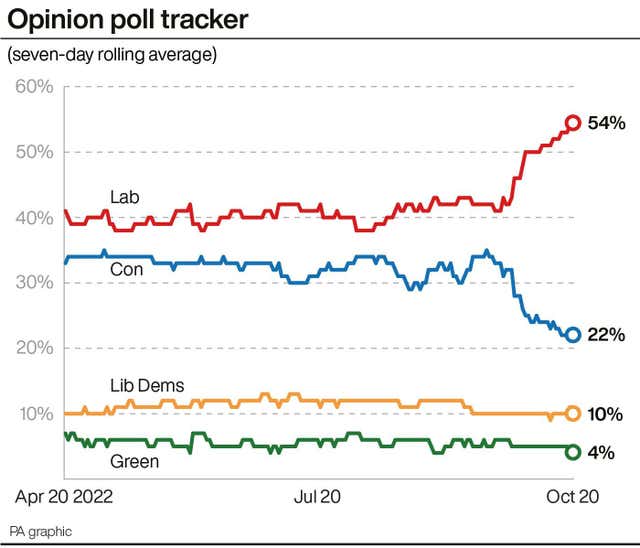
(PA Graphics)
He insisted she is focussed on delivering economic stability after making a “number of difficult decisions” including over the ministerial code, in a move that saw Suella Braverman out as home secretary. The spokesman was insistent that there are “no plans for any change” and that Ms Truss “will continue beyond” the new fiscal plan scheduled for October 31.
Others were less sure of her security, with Transport Secretary Anne-Marie Trevelyan insisting only that, “at the moment”, she believes Ms Truss will lead the party into the next election. Senior backbencher Simon Hoare was unable to say whether the country has a functioning Government as he gave Ms Truss “12 hours” to fix the situation.
The pound, which faced a battering over the disastrous mini-budget, slid again as City traders digested the growing turmoil in Westminster. Seven MPs demanded her exit before lunch was over, with the number expected to rise further – and with the scale of private demands believed to be far higher.
Veteran Tory Sir Gary Streeter said it now seems they must change leader but warned the Tories could still face “slaughter at the next election” even if “angel Gabriel” took over. Sheryll Murray said Ms Truss’s position was “untenable” after ugly scenes including allegations of bullying in the Commons and No 10 unable to say for hours whether the whips had quit.
Miriam Cates told Times Radio “it’s time for the Prime Minister to go”, with Henry Smith demanding she does the “honourable thing” in order to get “solid leadership”. Tory Jill Mortimer said the “deteriorating situation” on Wednesday left her with no choice but to submit a letter of no confidence to Sir Graham.
But who would succeed Ms Truss remained a major point of contention, with Steve Double demanding a unity candidate such as Rishi Sunak after Ms Truss “lost control”. Former culture secretary Nadine Dorries, however, was tipping Boris Johnson, forced out just months ago over a series of scandals, to take over again.
The turmoil appeared to be affecting the pound as sterling declined by 0.27% to 1.119 against the US dollar – its lowest reading this week. The events of Wednesday saw Ms Braverman lash out at Ms Truss’s “tumultuous” premiership as she resigned and accused the Government of “breaking key pledges” including on immigration policy.
Her departure, just five days after Kwasi Kwarteng’s sacking as chancellor, means the Prime Minister has lost two people from the four great offices of state within her first six weeks in No 10, with all eyes on whether other Cabinet ministers could follow suit.
The exodus appeared to continue, with speculation chief whip Wendy Morton and her deputy Craig Whittaker had resigned in fury at the handling of a vote on a Labour motion over fracking. At 9.49pm – over two hours after the vote – No 10 issued a statement saying both remained in post.
In an extraordinary further update at 1.33am, Downing Street said the Prime Minister has “full confidence” in both of them.
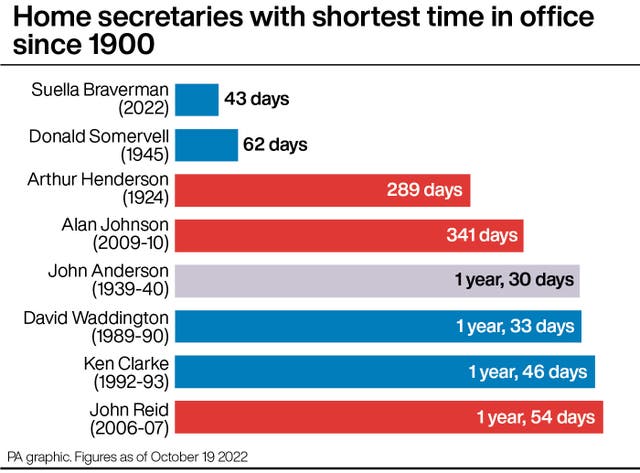
(PA Graphics)
It came after climate minister Graham Stuart told the Commons minutes before the vote that “quite clearly this is not a confidence vote”, despite Mr Whittaker earlier issuing a “100% hard” three-line whip, meaning any Tory MP who rebelled could be thrown out of the parliamentary party.
No 10 later said Mr Stuart had been “mistakenly” told by Downing Street to say the vote should not be treated as a confidence motion, and that Conservative MPs were “fully aware” it was subject to a three-line whip. A spokesman said the whips would be speaking to the Tories who failed to support the Government, and those without a “reasonable excuse” would face “proportionate disciplinary action” – although that does not necessarily mean whey would have the whip removed.
The confusion led to ugly scenes at Westminster, with Cabinet ministers Therese Coffey and Jacob Rees-Mogg among a group of senior Tories accused of pressuring colleagues to go into the “no” lobby, with Labour former minister Chris Bryant saying some MPs were “physically manhandled into another lobby and being bullied”.
Business Secretary Mr Rees-Mogg insisted he had seen no evidence of anyone being manhandled, but senior Tory MP Sir Charles Walker said what took place was “inexcusable” and “a pitiful reflection on the Conservative Parliamentary Party”. Ms Trevelyan told Sky News it is “never acceptable” for MPs to be “manhandled” into voting, adding she was “shocked” by reports from the Commons.
She said Speaker Sir Lindsay Hoyle would be investigating “to ensure that these scenes and indeed these situations do not happen again”. Tory rebels were confused over whether they still had the party whip, with Siobhan Baillie saying: “I don’t know but I hope so.”
There is speculation that Sir Graham has already received more than 54 letters calling for a confidence vote in the Prime Minister, the threshold for triggering one if Ms Truss was not in the 12-month grace period for new leaders.
Key moments from Liz Truss’s rocky start in the top job
Just over six weeks after taking the reins in No 10, the Prime Minister has lost two Cabinet members, watched her economic strategy go up in smoke, and faced calls to resign from roughly a dozen of her own MPs.
Here, the PA news agency looks at the key moments of her premiership so far.
– September 5: Liz Truss is the victor in the Tory leadership contest and will become the country’s next prime minister. She promises a “bold plan” to cut taxes and grow the economy and “deliver on the energy crisis”.
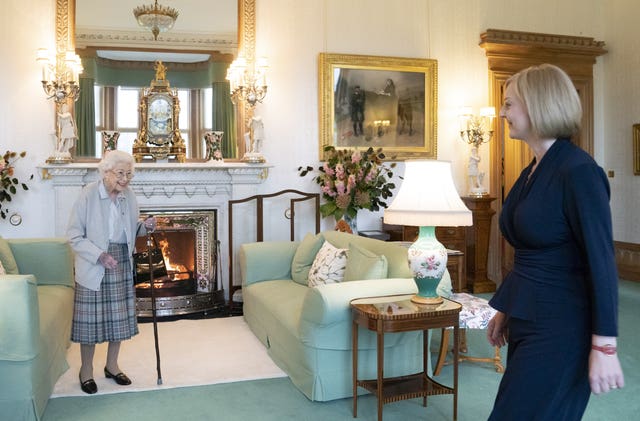
The Queen welcomes Liz Truss during an audience at Balmoral where she invited the newly elected leader of the Conservative party to become Prime Minister(Jane Barlow/PA)
– September 6: Ms Truss becomes Prime Minister after being invited to form a new government by the Queen at Balmoral. Later that afternoon, in her first speech in Downing Street, she says she is honoured to take on the role “at a vital time for our country”. Kwasi Kwarteng is appointed Chancellor of the Exchequer.
– September 7: Ms Truss uses her first Prime Minister’s Questions to promise to work with MPs across the House to tackle “the challenges we face” at a “vital time for our country”. She confirms she will set out her package of support to deal with soaring energy bills the following day.
– September 8: In Parliament shortly before midday, the PM announces a new energy price guarantee and promises support for businesses struggling with bills for six months, with targeted help for vulnerable firms beyond that. She describes it as “the moment to be bold”, adding: “We are facing a global energy crisis and there are no cost-free options.”
Soon after her economic announcements in the Commons, Buckingham Palace issues a statement saying doctors were concerned for the Queen’s health, and that the head of state was under medical supervision.
A Palace statement is released at 6.30pm, saying: “The Queen died peacefully at Balmoral this afternoon.”
– September 9: The King holds his first in-person audience with Ms Truss at Buckingham Palace. Politics all but comes to a halt as the country observes a national period of mourning.
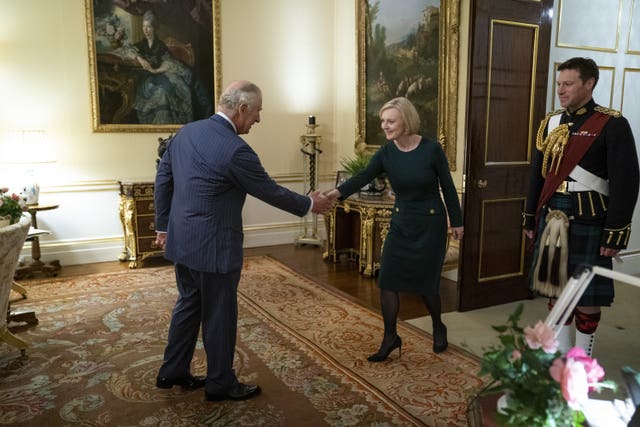
The King welcomes new Prime Minister Liz Truss at Buckingham Palace (Kirsty O’Connor/PA)
– September 19: The Queen’s funeral is held at Westminster Abbey in London.
– September 23: Mr Kwarteng announces the biggest raft of tax cuts for half a century. Using more than £70 billion of increased borrowing, he sets out a package which includes abolishing the top rate of income tax for the highest earners and axing the cap on bankers’ bonuses while adding restrictions to the welfare system.
The pound falls to a fresh 37-year low as “spooked” traders swallow the cost of the spree.
Questioned by reporters later that evening, the Chancellor insists his plan will encourage investment in the UK and rejects the suggestion his economic announcement was “a gamble”.
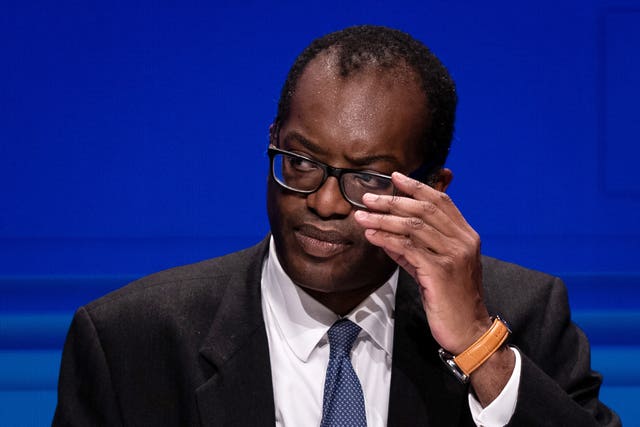
As chancellor, Kwasi Kwarteng announced the biggest raft of tax cuts for half a century (Aaron Chown/PA)
– September 29: Almost a week on, the PM insists the Government had to “take urgent action to get the economy growing” in her first public comments since the mini-budget market turmoil.
– October 2: Ms Truss acknowledges mistakes over the mini-budget but says she is standing by her tax-cutting plan as she refuses to rule out public spending cuts.
The PM admits she could have done more to prepare the ground for Mr Kwarteng’s financial statement, and she faces accusations of throwing her Chancellor “under the bus” by saying the abolition of the 45p top rate of tax was made by him, and not discussed with the Cabinet.
– October 3: In a dramatic U-turn, Ms Truss and Mr Kwarteng abandon their plan to abolish the 45p rate of income tax for top earners.
“We get it, and we have listened,” the Chancellor says, in language echoed in a tweet from the PM less than 24 hours after she said she remained absolutely committed to the cut.
Somewhat embarrassingly, Ms Truss was still defending the 45p tax rate in a TV interview filmed just hours before the U-turn.

Liz Truss U-turned on her controversial plan to abolish the 45p rate of income tax for top earners (House of Commons/PA)
– October 4: Mr Kwarteng says the Queen’s death added to the “high-pressure” environment around the preparation of the mini-budget. In an interview with GB News, he says it is important to place the so-called fiscal event in the “context” of the Queen’s death and funeral.
– October 5: Ms Truss pledges she will “get us through the tempest” and “get Britain moving” as she delivers her first Tory conference speech as party leader.
– October 8: Four Cabinet ministers urge colleagues to rally behind Ms Truss as the PM battles to steady the Tory ship following a week blighted by infighting.
– October 10: Mr Kwarteng bows to pressure to bring forward the publication of his financial strategy and independent economic forecasts. Completing another U-turn, he agrees to set out his medium-term fiscal plan alongside Office for Budget Responsibility (OBR) predictions on October 31.
– October 11: As Parliament returns, the Chancellor is warned, during a session of Treasury questions, that the Government’s economic credibility would be further shredded if he tries to push through the policies without the support of Conservative MPs.
– October 12: Ms Truss insists she will not cut spending to balance the books, despite economists and the financial markets continuing to question her plans.
She says she is “absolutely” not planning public spending reductions, but insists taxpayers’ money will be used well.
– October 13: Mr Kwarteng says his “total focus is on delivering on the mini-budget” in response to speculation about a U-turn on the measures.
– October 14: Mr Kwarteng is sacked, having flown back early from International Monetary Fund talks in Washington. He says he has accepted Ms Truss’ request he “stand aside” as Chancellor.
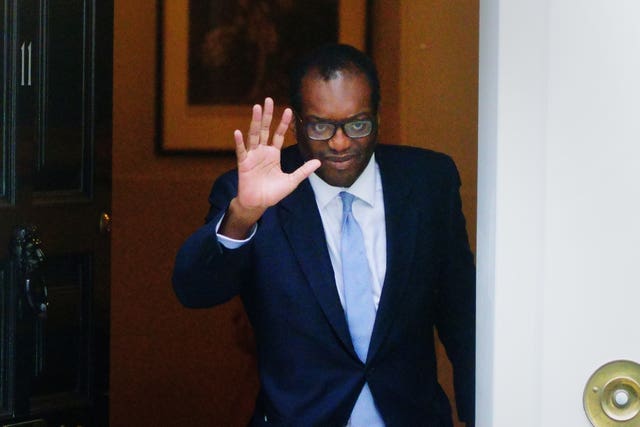
Outgoing chancellor Kwasi Kwarteng leaves 11 Downing Street after he accepted Prime Minister Liz Truss’ request he “stand aside” (Victoria Jones/PA)
The Prime Minister replaces her ideological soulmate at the Treasury with Jeremy Hunt, the former foreign secretary who backed her rival Rishi Sunak in the Tory leadership contest.
Ms Truss dismisses calls for her resignation at a hastily arranged eight-minute press conference in Downing Street, during which she takes just four questions from journalists.
She announces she is abandoning Mr Kwarteng’s commitment to drop the planned rise in corporation tax from 19% to 25% – even though it was a central plank of her leadership campaign – saving the Exchequer £18 billion a year.
Andrew Bailey, the Governor of the Bank of England, speaks to Mr Hunt following his appointment.
– October 15: The new Chancellor indicates the PM’s immediate economic plan is now largely defunct in a series of broadcast interviews.
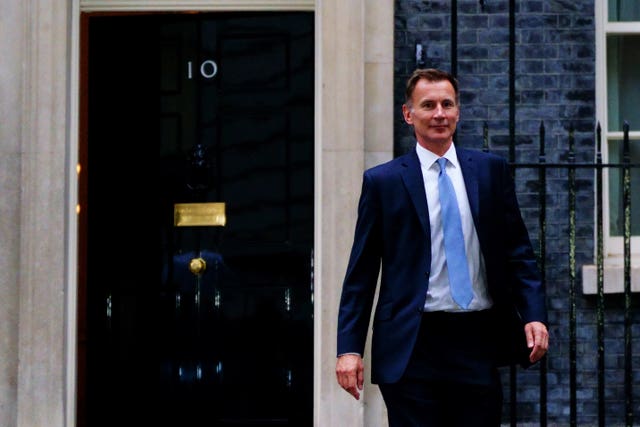
Jeremy Hunt leaves 10 Downing Street in London after he was appointed Chancellor of the Exchequer (Victoria Jones/PA)
Mr Hunt criticises the “mistakes” of the Truss administration and warns of “difficult decisions” to come on tax and spending.
In an unusual intervention, US President Joe Biden appears to join in the criticism of Ms Truss’s original plan, telling reporters “I wasn’t the only one that thought it was a mistake” and calling the outcome “predictable”.
– October 16: Former minister Crispin Blunt becomes the first Tory MP to publicly call for Ms Truss to quit, saying the “game is up” for the Prime Minister.
He is followed by Andrew Bridgen and Jamie Wallis, while other senior figures within the parliamentary party express deep unease with the PM’s leadership but stop short of calling for her to go.
Labour urges Ms Truss to come before Parliament to face MPs.
– October 17: Mr Hunt ditches the bulk of the PM’s economic strategy in an emergency statement designed to calm the markets.
The Chancellor scales back the energy support package and scraps “almost all” the tax cuts announced by his predecessor.
He abandons plans to slash the basic rate of income tax by 1p – which had been due to be brought forward to April – saying it will remain at 20p in the pound until the country can afford to reduce it.
The cut in dividend tax promised by Mr Kwarteng is also axed in the policy bonfire, along with VAT-free shopping for overseas tourists, the freeze on alcohol duty, and the easing of the IR35 rules for the self-employed.
Ms Truss sits silently in the Commons for roughly 30 minutes as her Chancellor informs MPs of the change of direction, staring straight ahead as he bins huge chunks of her plan.
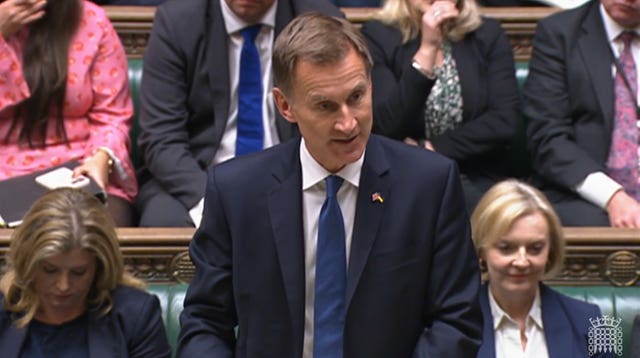
Chancellor of the Exchequer Jeremy Hunt alongside the Prime Minister in the Commons (House of Commons/PA)
The PM admits to a meeting of the One Nation group of Tory MPs that “we tried to do too much too quickly”, as she seeks to shore up support for her premiership.
In a sit-down interview with the BBC’s Chris Mason, she apologises for her “mistakes” and pledges to lead the Tories into the next general election.
– October 18: Ms Truss survives a meeting of the Cabinet without any ministers calling for her to quit, while Mr Hunt tells colleagues they must review departmental budgets to find ways to save taxpayers’ money.
Downing Street sparks a backlash by indicating ministers could ditch their commitment to the pensions triple lock.
The Prime Minister addresses Tory MPs from the European Research Group (ERG), telling them that she found axing her tax-slashing programme “painful” and did it “because she had to”.
Mr Hunt meets Sir Graham Brady, chairman of the powerful 1922 Committee of backbench Conservatives.
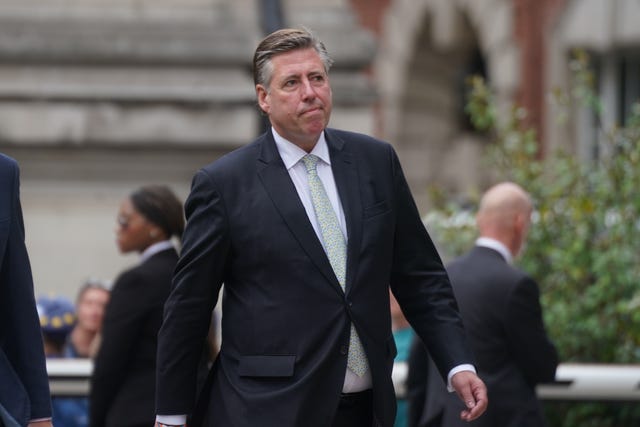
Sir Graham Brady, chairman of the powerful 1922 Committee
– October 19: The PM declares she is a “fighter, not a quitter” and insists she is “completely committed” to the triple lock on state pensions at PMQs.
Tory MPs are told a Labour vote in the Commons seeking to ban fracking is being treated as a “confidence motion” in Ms Truss’s embattled Government.
Deputy chief whip Craig Whittaker warns his colleagues the vote is a “100% hard” three-line whip, indicating that dozens of Conservatives who oppose the controversial gas extraction method face being kicked out of the parliamentary party if they do not follow orders in the lobbies.
But confusion ensues when climate minister Graham Stuart tells the Commons: “Quite clearly this is not a confidence vote.”
It leads to ugly scenes at Westminster, with Cabinet ministers Therese Coffey and Jacob Rees-Mogg among a group of senior Tories accused of pressuring colleagues to go into the “no” lobby.
Labour former minister Chris Bryant claims some MPs were “physically manhandled”.
Meanwhile, Suella Braverman dramatically quits as home secretary, citing a “technical infringement” of the ministerial rules, and criticising Ms Truss’s “tumultuous” premiership.
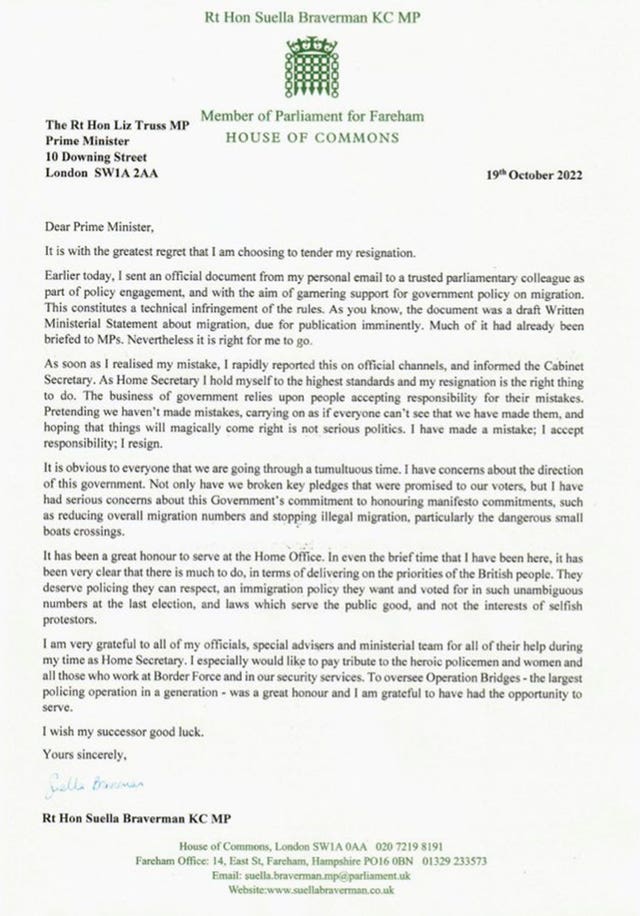
The resignation letter from Suella Braverman (Suella Braverman/Home Office/PA)
Labour’s motion is defeated by 230 votes to 326, majority 96, but there is speculation that Chief Whip Wendy Morton and her deputy, Craig Whittaker, have resigned in fury at the handling of the affair.
At 9.49pm – more than two hours after the vote – No 10 issues a statement saying both remain in post.
Overnight, Downing Street says Mr Stuart was “mistakenly” told to say it was not a confidence motion, adding that Conservative MPs were “fully aware” it was subject to a three-line whip.
A spokesman says the whips will be speak to the Tories who failed to support the Government, and those without a “reasonable excuse” will face “proportionate disciplinary action”.
– October 20: Cabinet minister Anne-Marie Trevelyan says she believes “at the moment” it is “still the case” Ms Truss will fight the next election as Prime Minister.
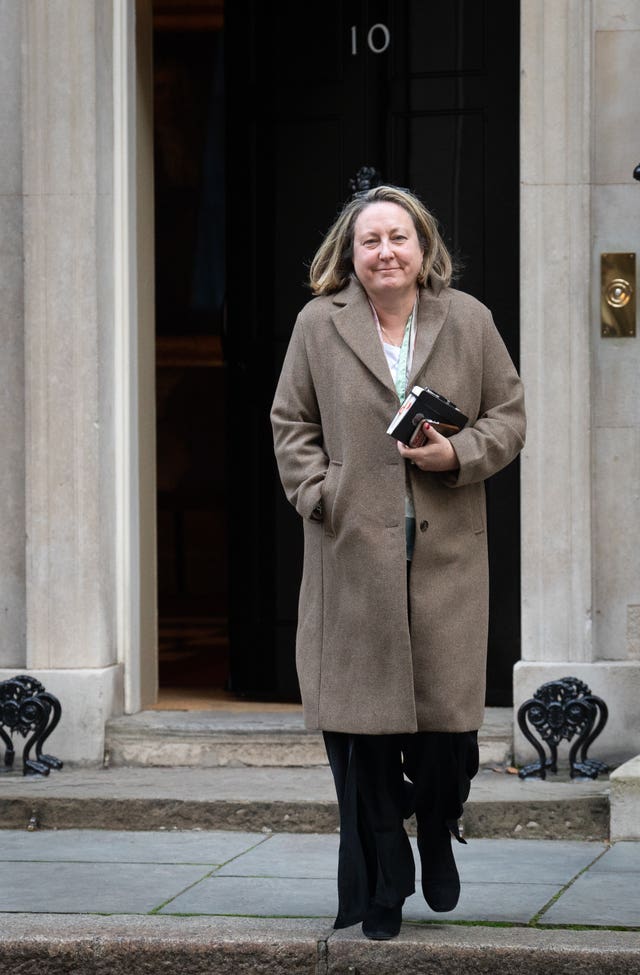
Anne-Marie Trevelyan says she believes “at the moment” it is “still the case” Ms Truss will fight the next election as PM (Stefan Rousseau/PA)
But pressure on the PM continues to mount, with more backbenchers adding their names to the growing list of Tory MPs publicly demanding her resignation.
Speaker Sir Lindsay Hoyle says he has asked the Serjeant at Arms and other officials to investigate allegations made about incidents in the Commons on Wednesday night.







